The Stern Grove Festival is set to begin its 87th year of live music in its beautiful outdoor Sunday San Francisco setting in the city’s Parkside District. This year’s lineup is stellar with an amazing array of talent that features performances by Herbie Hancock, Lucinda Williams, Chaka Khan, and the return of the festival’s very first performers, the San Francisco Symphony. Of course these standard bearers are balanced out with newer talents like Tegan & Sara, Masego, and Franc Moody.
Perhaps, one of the most anticipated Sunday shows of this year’s series is the Stern Grove debut of Chicano Batman. The Los Angeles band made their name as a quartet who explored a variety of sonic and cultural influences. They emerged on the scene as a psychedelic soul band that could trace some of their original influences to Chilean and Peruvian psychedelic music that has the organ as main instrumentation and rhythm, and complemented that with guitar, bass, and drums. They also dabbled with classic soul sounds and funk, heavy rock, and Tropicalia. They sported tuxedo shirts and jackets. These elements introduced them to the musical world at large.
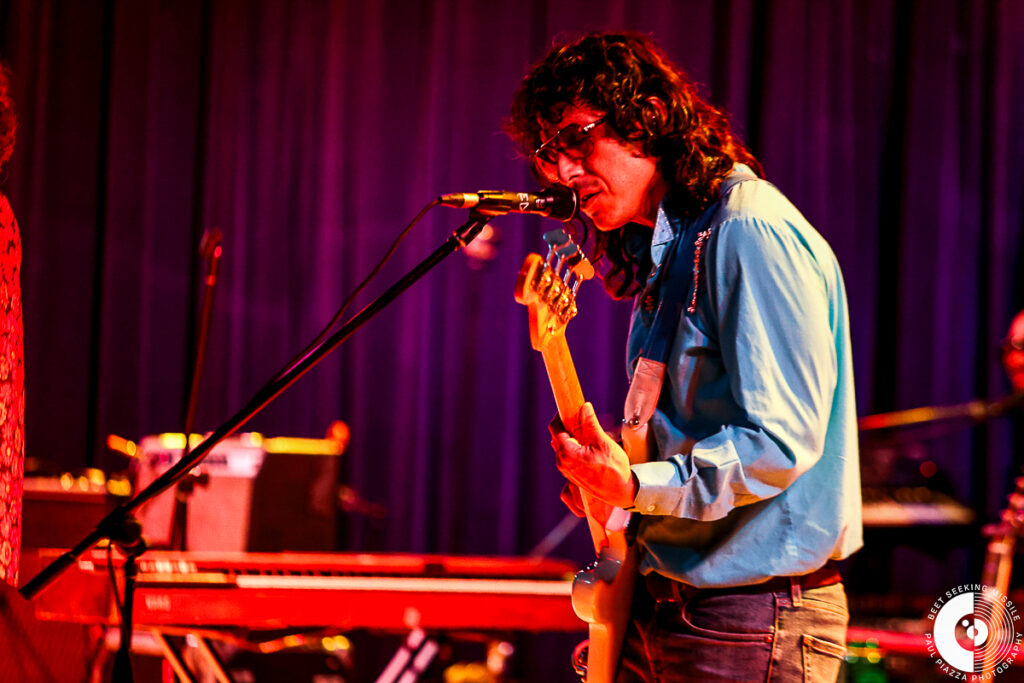
Now, sixteen years into their journey, the band is made up of members Bardo Martinez on keys/guitar/vocals, Carlos Arevalo-guitar, and bassist/vocalist Eduardo Arenas. Drummer Gabriel Villa left the band in 2022. All three band members are strong composers and many of their creations encompass a timeless lyrical perspective that occasionally touches on issues of the modern world with ever evolving sounds.
Their latest release, Notebook Fantasy, is their 5th album. It was recorded at the legendary Sunset Sound in Los Angeles and produced, mixed, and engineered by John Congleton (David Byrne, St. Vincent, Budos Band, The Roots). The record is an exemplary continuation of their musical evolution as it takes things to a new dimension of music that is defined by mood more than by genre or style. It also features some strong studio musicians performances. The drum duties were shared by Tamir Barzilay and Dylan Elise, a couple teams of backup vocalists sang on the album, and a string section was utilized for the first time in the band’s recording history. The group are wrapping up a successful US tour and the Stern Grove show is the day after the band’s first headlining gig at LA’s legendary Forum.
SF Sonic recently spoke to bassist/vocalist/songwriter Eduardo Arenas about the evolution of the band, their songwriting and recording process and the challenges and rewards of Chicano Batman.
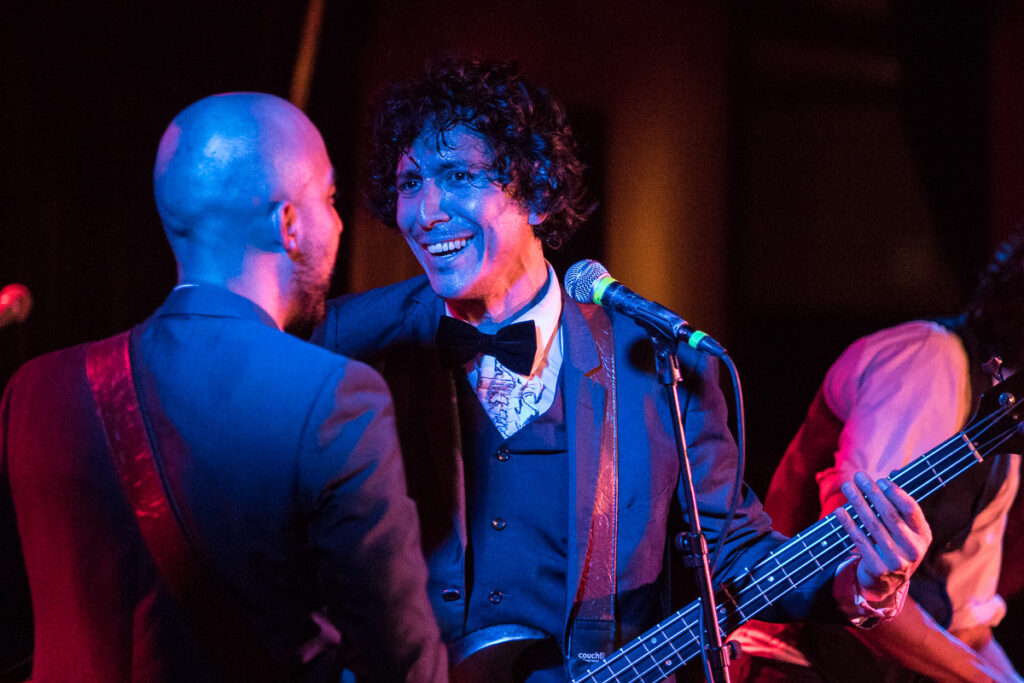
Paul Piazza – I’ve been taking a look at your tour dates and you’ve been criss-crossing the country and it looks like a lot of different opportunities have opened up for you?
Eduardo Arenas – Most definitely. On this run, we’re playing bigger rooms and trying to see where our potential is at. When you keep doing it, you just gotta keep playing bigger rooms and hope that you are going to fill it up even more.
PP – Absolutely. It seems like you’re on a great roll.
EA – Most definitely.
PP – You know, I’m in Sacramento and the first time I caught you guys was back in 2014 you played a little art space called the Sol Collective?
EA – Ohhhh!! Loved that show! That was epic!
PP – Ya, it was so packed in that small space and we were talking about it for the weeks to follow. Now we got you guys coming into Stern Grove which has Herbie Hancock headlining not too long after you guys. Chaka Khan too.
EA – Really!?!
PP – Ya, it’s a big traditional outdoor venue. Over 80 years of live music there..
EA – Wow…Crazy.
PP – Ya. And what’s even crazier to me is that the night before you’ll be just coming off headlining the Forum in LA.
EA – Ha! Ya, that’s wild!
PP – So tell me, how’s this journey going for you?
EA – You know, to be perfectly honest, the Forum to me means the success of all our bands we’ve been playing with over time in LA, all of our families, all of the people that believed in us, all the people that supported us. You know, it’s not an individual feat and you know this whole…’You’ve made it’ saying? I don’t believe anybody ever makes it because there is still the day after and the day after that. But at the same time, I think one of the reminders about this whole journey is to enjoy every victory because although there are bigger fish to fry, at least you’re eating. And eating is good, you know?
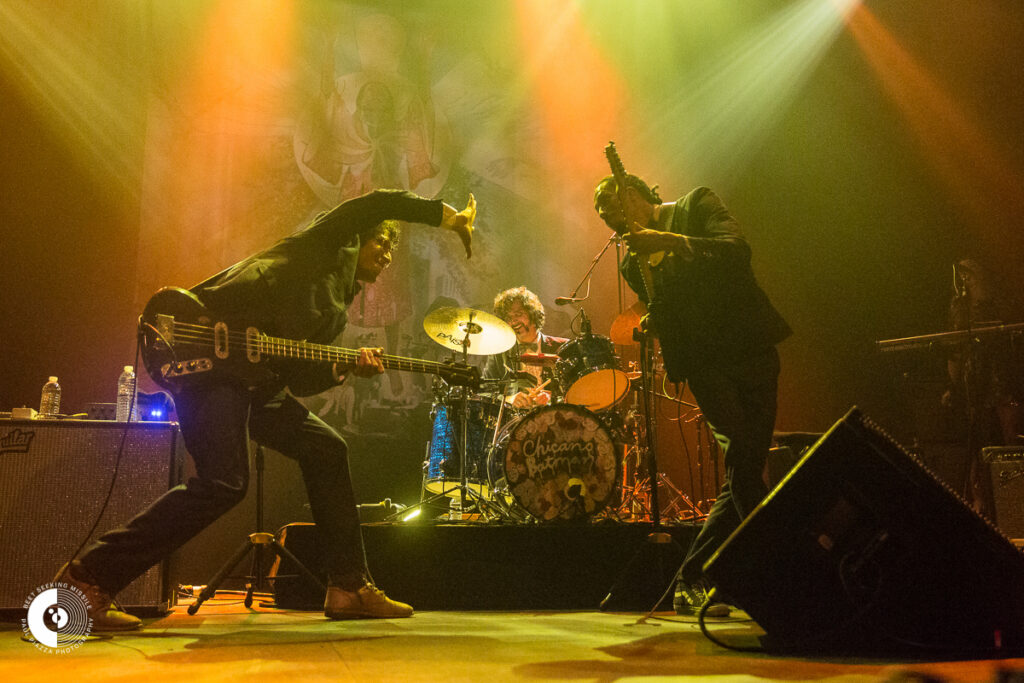
PP – It sure is.
EA – But after we played the Shrine for two sold-out nights, it was amazing. And I can remember thinking, after playing that show, the forum is next! It felt natural to say that and to feel that in the moment. And now we’re playing the Forum. And my mom is going to be there, my wife, my family, and you know we’re from LA. One of the first concerts I saw was at the Forum. Metallica in 1996. I saw Prince there when he did 21 nights in a row, in 2010. I saw Gabriel Garcia Marquez fight his last fight there. So you know, it’s part of my history as well. And I hope this night is part of the history for a lot of other young fans.
PP – That’s awesome. Are you an LA native?
EA – From Boyle Heights, born and raised.
PP – When we spoke way back at that Sol Collective show, did you tell me you had done some DJ gigs?
EA – No, we’ve never done that. But Chicano Batman has always played with DJs. That was a big identity of our band as we were growing. It was a very smart move because otherwise you’re building your own scene when you can collaborate on a Thursday night or something like that and the music and the DJs starting meshing together. In LA, we played with a guy called DJ Fresco. I tell you, all the funk and all the Ethiopian, Columbian, all the Nigerian stuff, the Brazilian thing, and all of that meshes into our music. And that’s how we learn where the aesthetic is. Where the cool is. Where the heads are at. Where the ears are at. Our nights were cracking, because we were always playing with DJs.
PP – Nice. I love the new record man. It’s so beautiful.
EA – Thank you.
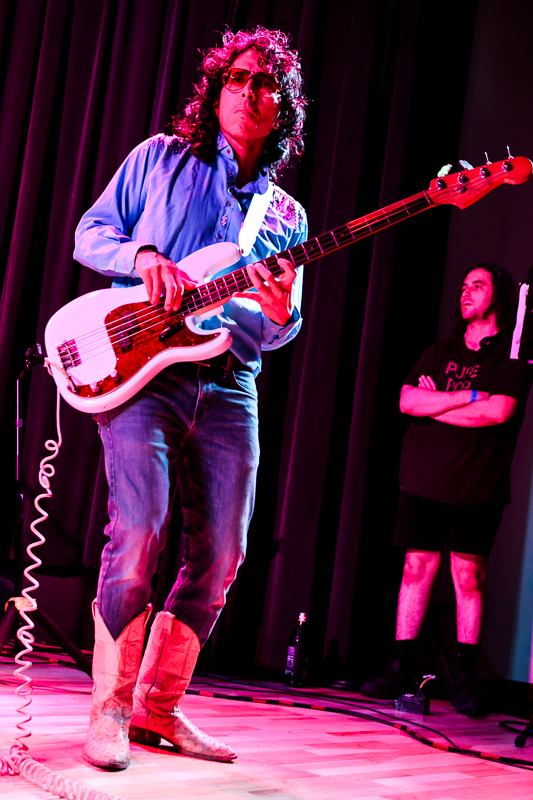
PP – The first track that kind of made me stop in my tracks was ‘Parallels.” Noticing the way you and Bardo were trading verses and how the whole arrangement is so epic. Can you talk about that a little bit?
EA – Ya, I brought that thought to the table. Carlos, when we’re in the studio, he has these low key complaints that my songs are always long and drawn out. You know like, ‘why can’t you just make a simple song!?’ And the producer was like, you know this is just some vision. It’s a love song just drawn out. That song was a perfect opportunity for Bardo and I and Carlos to just kind of put it out on the table. This band has been around for about 16 years and through relationships, brotherhood, marriage -16 years has a lot of strife, issues, communication problems, resolution…everything. You know it’s a relationship. And Bardo and I were in a Western. You know, like a battle, so I said, ‘Let’s just put it on the table.’ And we did a draft and then we did another draft to get more into it. It was awesome because it was basically Bardo and I going through therapy together with the lyrics. So with the lyrics he was like, ‘Hey, tell me something that would hurt me’ and then all I could really say was honesty about all of the things I felt in the past. I’d say ‘What do you think about this line, ‘I never really trusted you I always saw through you. There would be silence and I would say, ‘that’s some old drama bro,’ and he’d say, ‘don’t worry, I’m gonna get you back right now.’’ It was heavy but he was very light at the same time. It was just real. I remember our producer saying, ‘Your fans are really going to enjoy this song. One of my main things was, ‘Let’s be more real.’ We don’t have any obligation to serve the public. We only have an obligation to serve ourselves and watch ourselves grow in this process…and have fun. You know I’m a true believer that when a process is like that, things become real timeless. And it becomes about you and then it becomes about everyone else because everyone is afraid to identify with the issue that you’re putting on the table.
PP – Well said. And I appreciate that honesty. I remember listening to it and saying, whoa, this is a very vulnerable moment happening on this platter right here. How did you guys come about to using the strings? Do you think that emphasizes things more?
EA – Absolutely. We had an idea on this record that there are no boundaries. On Invisible People (the band’s previous album), it was great production and synth heavy. We did not want to do that. On this album, we wanted songs where you could pull out a guitar and sing along. That was a challenging record. We didn’t want to make anything lo-fi. We said, let’s make it hi-fi. And we worked with John Congleton, who is a master at that. That was one thing. But Bardo wanted strings. He said, ‘If we’re going to make these songs more epic, we’ve got to bring in a string section. That was a really awesome experience to tell you the truth-this is how it went down. We were like, “We want strings.” Our producer said, I know a guy. I don’t have one bad thing to say about him. I’ve worked with him before. We were like, alright cool. Bring him in. We listened to the songs we wanted to work on. We did voice memos. We would just hum ideas on the spot and record them. He went home and said “I’m gonna work on this.” In about a week, he came back with MIDI arrangements on the computer, charted and everything. So what we were listening to in the studio was this charted, midi arrangement and we were like…”What?! This is insane.” And we told him, if we just use this program you brought, it would be epic. But we gave him some feedback and then a quartet came in and it was just a different level. It was a really beautiful thing to witness. Musicianship at the highest level. We didn’t even get a chance to converse with them. The string people just came in, got to work and left. It was crazy.
PP – Taking care of business.
EA – Business time.
PP – I love those cello accents.
EA – Ya, it’s like a drama. What was cool was on “Fairytale Love”, it was like a 50s combo. There’s some songs that really brought it out, like what that song is. It really elevated it. “Era Primavera” is another one. It made it even more epic. So I really appreciate what the strings did. We were always anti-string. We were like, it’s not rock ‘n’ roll. It was always an issue with our band we would say, “Let’s not add anything that we can’t do live.” But when we came up with this idea we were like “Screw that let’s do whatever it takes.” And it just opened up the whole gamut.
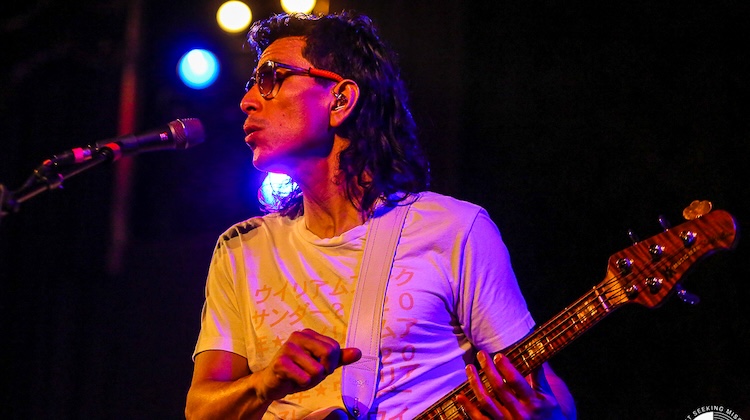
PP – And I noticed that you guys are performing some of these songs in your current setlist, how are you doing that?
EA – We are just resynthesizing. We are doing some strings on synth. But what’s cool about live is you can reinvent everything. So we reinvent arrangements. What you’re left with on the album is a feeling. As long as you find that essence through a different instrumental arrangement, then it’s cool. You know these songs are living organisms when we play them live, they constantly shift. We constantly change patches. You know it’s a very finite of harmonics and vibration and frequency when we’re playing live and it can rub you nice or it can rub you in a very ecstasy way. So we have fun playing it live and seeing how people react.
PP – I want to come back to ‘Parallels’ one more time. When you sing ’Freedom isn’t free’ it’s kind of in contrast with the Freedom is Free album and the song itself. So can you speak about that?
EA – Sure. That’s a very good question. Just the other day my son found the CD of Freedom Is Free in my car and wanted to listen to it. He’s four. So we’re listening to the record, and I’m listening to that song and I recalled the time and place we recorded this in the Diamond Mine Studios in New York and we were all fighting. We were fighting for arrangements. We all wanted to get it our way. The producer was acting as a referee. It was a different time and we were just different people. Now we have kids and it’s a different time. Then we were really trying to fight for each other’s space and patience. And we went through so much more as a band. So Freedom is Free, that’s Bardo’s essence. You know, the air we breathe is free. You know it’s like military and US patriotism took control of that and and put it into some military thing where ‘Freedom is defending your country with arms, you know, and being aligned to some kind of political ideology.’ And it was like, hold on, freedom is my right to nature. My right to breath. My right to fuck. You know freedom has always been free, but somehow it’s been hijacked. And the way Bardo sees freedom is a whole other way than me or Carlos or any of the other Bat members see it. So on Parallels when we’re writing these lyrics I’m just attacking Bardo’s whole way of being. Like, remember, freedom isn’t free bro. Some things cost big.
We use an expression in the band we don’t like, ‘Your freedom ends where mine begins.’ And it’s like, those are fighting words. It’s like ‘Yo, you can be who you want, but don’t come bringing that shit on my doorstep.’
We struggle with that as a band…and right now, it’s a different playing field. We’ve resolved a lot of these issues. In our relationship, we’re constantly trying to work at getting better at communicating and not casting shadows on each other’s sun. And right now, everybody shines. Now it’s, ‘What are your fantasies? What are your goals? What are your dreams? And how can we support each other’s vision and dreams while being in this band together.’ That’s a very mature way to look at it versus back in the day where we just all wanted a piece of the pie. You know, because we’re all making so many commitments, we’re all on the road, we’re all spending all of these hours, we’re all broke. You know we’re all on the road together. You know in bands it’s like teams -s omeone’s the center, someones’s the defensive player of the year, another person is the scorer. So as we grow older into this band thing we all fit into our categories. So Freedom Isn’t Free is just me throwing back at Bardo. You know, your shit ends where mine begins. Now we can talk about it, before it was a firecracker. Now we can process it and talk about it.
So ‘Parallels’ to me is so cool because if our relationships weren’t healthy, we wouldn’t be able to talk about things like that or write a song about it and put it out to the whole world.
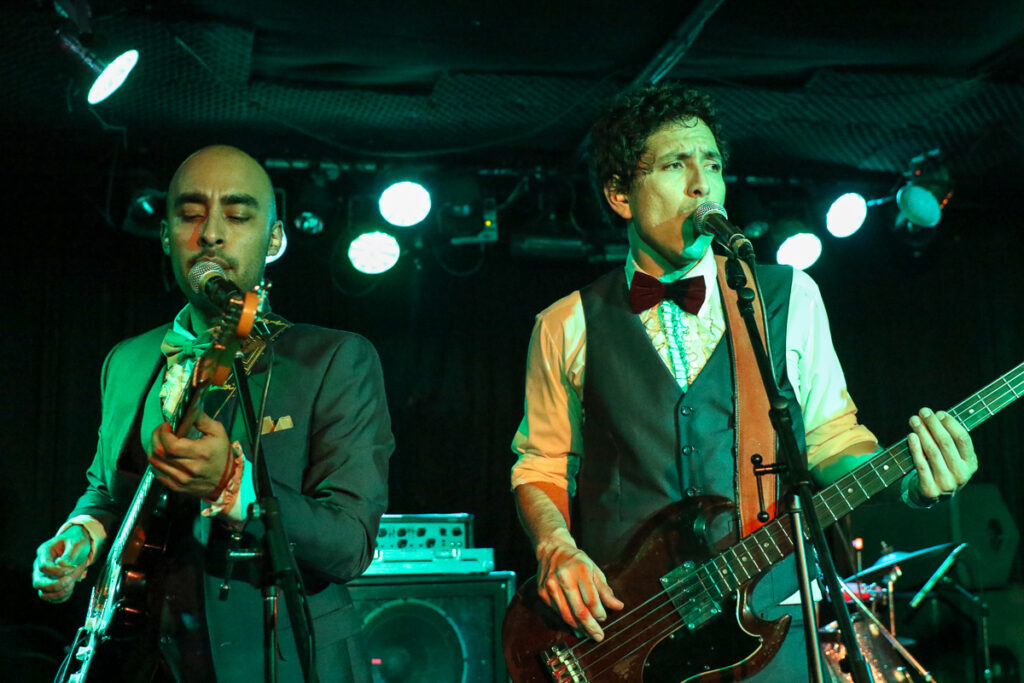
PP – Now let’s talk about the song ‘Fly.’ What a great song, what a great vibe, what a great video. To me that’s the feel-good hit of the summer. I just love that bass part that you throw down near the end. Especially on the video. Who do you look to for inspiration in the bass universe?
EA – Man, it’s so funny you asked me that because I did an interview with Consequence of Sound and they asked me about my top five bassists and who I found inspirational. I told my wife about it and I told her my answers and she smiled and told me, ‘You know you’re not going to get published right?’ (Laughs) And I said, “Of course I’m not.” Because I’m not talking about Willie B or James Jamerson or Pino Palladino or MonoNeon or Thundercat or anything like that. They’re all cool but my funk is in meringue and Salsa. And I’m talking like Columbian 70s, Cumbia Vallenato and 80s meringue from the Dominican Republic. I love the push and pull, the anticipation, the tension. The booty shake.
The bass had so much control over the whole body and over the whole song. And it’s where they don’t play that makes it exciting, and on this album, some of it is just classic style but on some of the things like ‘Fly’ and ‘Notebook Fantasy,’ I was just pretending to be a meringue player that came into a session to play a dance track. And what a great premier for me, because I don’t remember playing it and everybody’s so involved in their own parts and taking so many risks. And I remember the producer saying, for this next take maybe do this, that and Eduardo-you’re being very nasty. And I was like…thank you!
Sometimes you want to take some risks in the studio but if you get that look from your bandmate, you’re like, ‘I’ll tone it down now but in this case, it just seemed to fit. And true to that bass drop, we brought a fretless MusicMan into the room. A 70s one. We tried to use it on all kinds of things and it just wasn’t working. It was a clunky, unique sounding things and we’re just like, ‘This thing sucks.’
So then, I said I think it’s time we drop the elephant in the room and the elephant was that bass part on the spot. We were all excited about it. We were like ‘Dude that is nasty!’ And theproducer was ecstatic about it and we said, “All right we’re keeping it.”
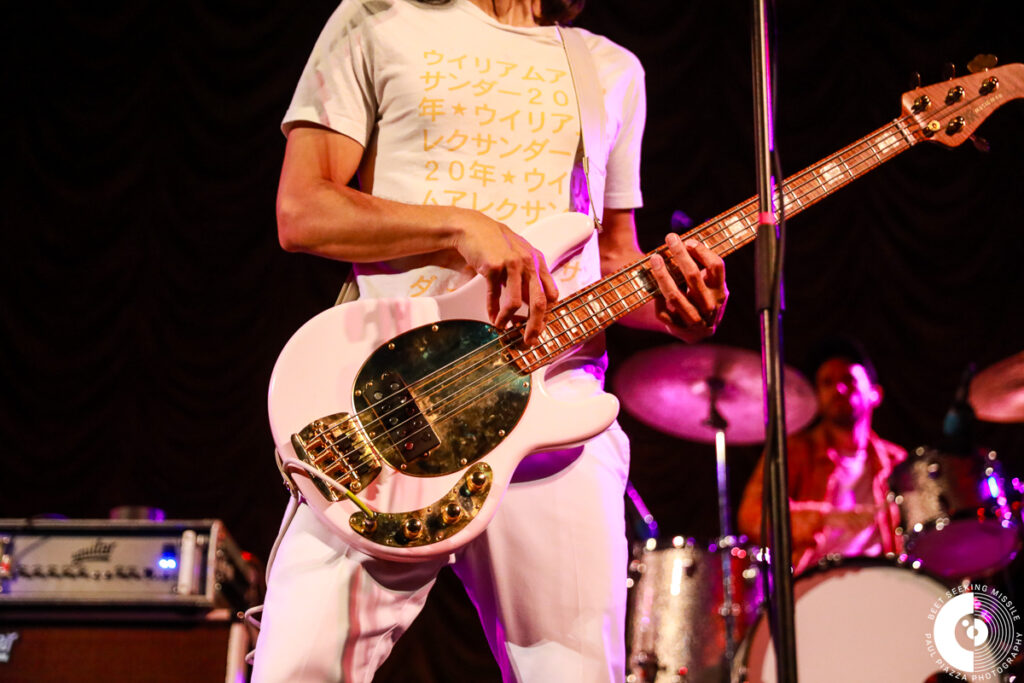
PP – And that was on the Music Man?
EA – Ya it was a 70’s fretless Music Man. Super Nasty. We didn’t use it for anything else but that section and it was like wow…it became really iconic.
PP – Sounds great!
EA – Thank you man.
PP – Let’s talk about the “Fly’ video, the vibe on that video is just tremendous.
EA – For the video, we left it up to the Giraffe Sisters, this duo of sisters who make a bunch of videos for people like Devendra Banhart and Sharon Van Etten. We kind of gave it up to them because if you leave it up to the band,we have so many directions. We’re like three different things-a light pole, a car, and an orange. You know, three different dudes that just go different directions so we told the Sisters, ‘This is the vibe of the song, we want some Prince, Rick James, let’s make this pop, let’s make it fun, lighthearted visuals.’ We don’t need a storyline so much as we want you to see the essence. The vibe. And a sexuality. That’s what we want out of this. And they wrote up the whole thing and we just showed up and on the spot just started doing our scenes and just went for it. That’s the point. All of our other songs have been pretty serious and this one we just wanted to have fun. The song is very light and very hip and we just wanted to have fun with it.
PP – And just looking at your setlists recently, it looks like it’s been played near the encore, so it looks like maybe it’s found its place?
EA – Most definitely. It sits well and the audience is really, really jamming to it. And they’re singing along. Ya, we put it in a place where we’re not trying to sell it you know? And that’s the cool thing about this new album. We have songs that are just great songs. We’re not putting them in places like the end or the beginning where we’re like check out our new song. We’re like no, no, no, no. We have sixteen years of songs and now we have them as dynamic tools to send them to the next place and I think ‘Fly’ just really anchors it. It’s almost like a home run. You know, bases are loaded, it’s time to bring it home.
PP – Nice! Another aspect to the album I really enjoyed are the backup vocals. I know I saw that Say She She came in on this one with you guys.
EA – There were two groups of backup singers, Say She She came and sang on ‘The Way You Say It,’’Fairytale Love,’ and ‘Losing my Mind,’ and we had three other singers, Fox, Maiya Sykes, and Leo, they are a soul trio. Their friends and they came in and absolute fire!
PP – I looked up at that trio’s resumes and they’ve done some pretty cool stuff.
EA – Ya, when we played on Jimmy Kimmel, we were like, it’s not their first rodeo. You know they’ve been there before. We’re at the level where we’re working with people who we consider our aesthetic and not so much intimidated by anybody’s level as a musician. You know, if you have the most amazing song, it’s like cool but I only need a drill. Everybody is so humble at every level and I appreciate how they do it.
PP – Absolutely, and I imagine the further along you are in this life, the larger of a network of friends you will get in the music world.
EA – Most def. And it all comes down to respect. We feel the respect from everybody and it’s just amazing.
PP – Another aspect I appreciate about you guys is that you take bands on the road with you who are relatively unknown and you guys put them out in front of your audience to give them an opportunity. I saw Brainstory with you guys. ColaBoi was with you guys in Chico last year. On the current dates I see you have Lido Pimienta with you and also the Red Pears on a couple of the shows. Anything you want to tell me about how you approach this aspect?
EA – The Red Pears are a special band because I feel like they are us back in the day. They are to the city of LA to what we were maybe about ten years ago. In fact, actually bigger because they are younger. They’re like a local phenomenon and they’re a trio and it just makes so much sense. I feel like Chicano Batman has opened the doors for bands like Red Pears and for us it’s just like, let’s bring it together the, let’s unite this whole movement.
Lido is a star. She is like a Columbian Aretha Franklin. She is epic, highly talented and it’s just an honor to be playing with people at that level. Brainstorm – they’re from the inland empire. They’re part of the Chicano Batman family. You know it’s them, Chola Orange. We’re just brothers. We all have a commitment. A dedication to do it at a higher level. You know, not every band could do it. There’s all kinds of differences and hardships and opinions and pride and egos. It’s like a thunderstorm out there and only the ones who really want it sacrifice more. And sometimes the demand is higher. And there’s a lot of luck involved. So every time we have an opportunity to bring some of these bands who are also out there hustling and get some spotlight, we bring em in. That’s just the way we are. We’re looking out for fam. Only fam. It’s a competitive world out there and instead of getting pitched bands by our booking and manager we’re like, nah what about our cousins? What about our fam? They’re badass. Just because they’re not on this level or that label doesn’t mean they’re not amazing so we’re also trying to bring this aesthetic to the world.
PP – In addition to all of the things that you do you guys just played the Psych Fest in Austin, Texas. Can you speak to how the psychedelic music scene relates to you guys?
EA – You know, at the beginning, we were like a Latin psychedelic soul band, we were doing crazy things. We were playing with keyboards, putting delays on it, we were jamming, we were like Yes, playing stuff from Fragile. We were just out there jamming and we didn’t really care what anybody thought. We just had songs and we played them. And it was amazing. Now, we’re getting asked to play in these psych fests where it’s not about the delays, and reverb and surf guitars and these psychedelic sounds. To me, psychedelic is now love. I think in Chicano Batman, our songs are about love. And its uttermost state of love and its euphoric. To me that’s the new psychedelic man.
PP – I love that. Finally, you’ve also done a bit of solo work. What’s the latest and greatest there
EA – Oh definitely. I have a couple of shows coming up in August. In Oxnard, LA and San Diego. August 8, 9, and 10th, doing some headlining shows. I’m here in LA kind of pioneering the Cumbia Quebradita and I’ve been doing this band for ten years now I just realized last week. And you know it’s just persistence, persistence, As a musician I have so many avenues of Hispanic. You know Chicano Batman is one of the big ones and for me, cumbia is in my heart and every time I get to do it and we see people dance and mosh and release, then I feel fulfilled that we are not abandoning this beautiful art form that’s in our blood. To me, I’m just trying to get closer to what’s in my blood and let it out in this lifetime. I don’t have any resentment over anybody or anything that I didn’t do what I wanted to do. And that I didn’t use my blood, my roots, my potential and my drive to get the best out of what I can do in this lifetime. And that’s what my solo work is.
PP – And I appreciate all of that.
EA – Thank you brother. Thank you so much for the interview, I had a lot of fun.
Photos by Paul Piazza.

